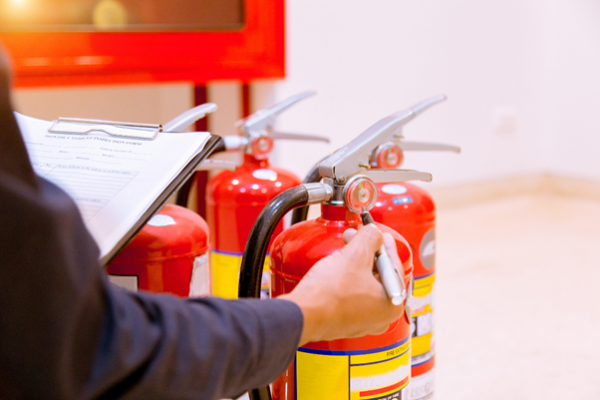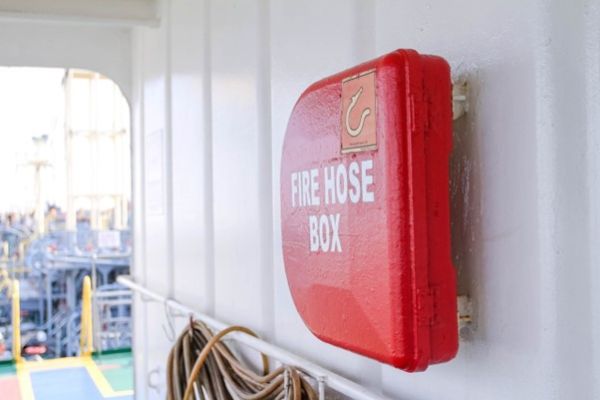Maintenance and Servicing of Fire Safety Equipment
Fire safety is critical for every home, office, or industrial facility. Fire safety equipment prevents and mitigates fires, but its effectiveness depends on proper maintenance and servicing. This article will explore the significance of regular fire system maintenance in simple terms, highlighting key steps and considerations.
I. Understanding Fire Safety Equipment
-
Before delving into the maintenance aspect, it’s essential to understand the types of fire safety equipment commonly found in buildings:
- Fire Alarms: These early warning systems detect smoke or heat and sound the alarm to alert occupants.
- Fire Extinguishers: Portable devices designed to extinguish small fires by releasing an extinguishing agent.
- Sprinkler Systems: Automatic systems that release water or other fire-suppressing agents to control or extinguish fires.
- Smoke Detectors: Devices that detect the presence of smoke and trigger alarms.
- Fire Doors: Specially designed doors that help contain the spread of fire and smoke.
II. The Importance of Regular Maintenance
Now, let's explore why maintaining this fire safety equipment is so crucial:
Ensures Proper Functionality: Regular maintenance ensures all fire safety equipment functions as intended. Malfunctioning equipment can lead to delayed response times or failure during an emergency.
Prolong Equipment Lifespan: Fire safety equipment has a limited lifespan like any other machinery. Proper maintenance can extend their longevity, saving you money in the long run.
Compliance with Regulations: Many jurisdictions have strict regulations regarding fire safety equipment. Regular maintenance helps you comply with these requirements, avoiding legal issues and penalties.
Prevents False Alarms: Neglected equipment can trigger false alarms, causing unnecessary panic and disruptions. Proper maintenance reduces the risk of false alarms.
III. Steps for Fire System Maintenance
-
Now that we understand the importance of fire system maintenance, let’s discuss the key steps involved:
- Regular Inspection: Conduct routine visual inspections of fire safety equipment to identify any visible issues, such as damage or corrosion. Examine fire extinguishers for visible damage too. Ensure the pressure gauge is in the green zone.
- Testing and Calibration: Periodically test and calibrate fire alarms, smoke detectors, and sprinkler systems to ensure they respond accurately to potential fire hazards.
- Battery Replacement: Replace batteries in smoke detectors and other battery-powered devices according to the manufacturer’s recommendations.
- Sprinkler System Maintenance: If your building has a sprinkler system, it should be inspected and tested regularly by a professional to ensure it functions correctly.
- Fire Door Maintenance: Fire doors should close automatically and latch securely. Regular checks can identify issues with door closers or seals that need attention.
- Documentation: Keep detailed records of all maintenance and servicing activities. This documentation is essential for compliance and helps track the history of your equipment.


- Project Coordinator
Fire safety equipment has a limited lifespan like any other machinery. Proper maintenance can extend their longevity, saving you money in the long run.
IV. Frequency of Maintenance
The frequency of maintenance depends on the type of equipment and local regulations. Here are some general guidelines:
- Fire Alarms and Smoke Detectors: Monthly visual inspections, with professional testing and calibration annually.
- Fire Extinguishers: Inspected monthly, with a professional inspection and servicing annually.
- Sprinkler Systems: Professional inspection and testing quarterly or as per local regulations.
- Fire Doors: Annual inspection and maintenance by a professional.
- Documentation: Maintain a log of all inspections, tests, and servicing activities for each piece of equipment.
V. When to Seek Professional Help
Some routine inspections can be performed by designated personnel, involving professionals for in-depth servicing and repairs. Seek professional assistance in the following situations:
- When any equipment shows signs of damage or malfunction.
- For annual or quarterly inspections and testing, as required by local regulations.
- When you lack the necessary expertise or equipment to perform servicing and testing.
Let's Wind Up
General International Group guarantees peace of mind with our comprehensive fire system maintenance services. Protect your property and loved ones with our expert care. Our dedicated team ensures compliance and readiness, preventing emergencies. Trust us for reliable, 24/7 fire system support, keeping you safe always.

